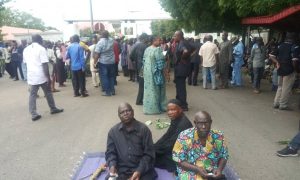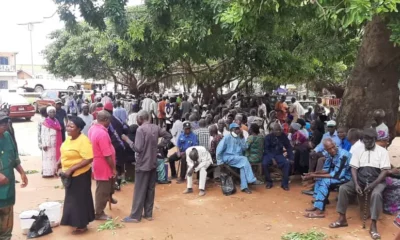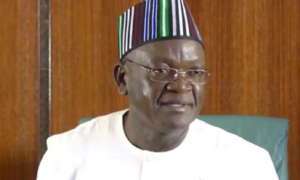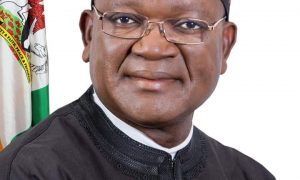Benue news
The Workers’ Payday Mentality in Benue pensioners

By James Uloko
Some time ago, a friend of mine made an observation about the behaviour of his friends and relations which he termed the Workers’ Payday Mentality.
He observed that his friends and relations who are on paid employment always complain to him about their employers when payment of their salaries are delayed or in arrears. On the other hand, when salaries are paid eventually, promptly or regularly, they tell no one, not to talk of commending their employers. According to him, the behaviour is more noticeable in the public service where delays or non-payment of salaries for months are common.
Perhaps, this mentality is a derivative of the journalistic definition of news as something new, different, unusual, abnormal or extra-ordinary.
Delayed or non-payment of salaries may well fit the definition of news and explain away why workers keep mum when all is well, nonetheless, I did not quite agree with my friend at the time. But now, with the benefit of hindsight and experience, I have come to accept my friend’s postulation as valid.
What brought this topic to mind is the case of Benue state pensioners. They have obviously been exhibiting the typical Workers Payday Mentality and it is not quite surprising. After all, they were public service workers until retirement and are still entitled to monthly salaries without work (pension)!
For yrears, cutting across three different civilian administrations, payment of pensions in Benue state, has been an intractable problem, just like in other states across the country. Since assumption of office in 2015, Governor Samuel Ortom, like his predecessors, has been battling with the plight of Benue pensioners. He inherited a backlog of over N70 billion in arrears of pensions due to Benue state’s retired workers. So far, the governor has paid over N40 billion, translating to more than half of the amount due. Naturally, the pensioners would not be impressed as long as the balance remains unpaid.
In order to ameliorate the sufferings of these senior citizens who could as well be his father, the Governor decided to allocate N700 million every other month to reduce the pension bill. This is made up of N400 million for state and N300 for Local Government pensioners. But each time this money is paid it goes unnoticed because no body tells you when he is paid, typical of our civil servants. You only hear the hues and cries when such monies are not forthcoming.
To give the impression that government is not doing anything at all is rather unfortunate. The recent uproar by the pensioners that government is not doing anything at all is quite disturbing. While it may be inappropriate for the government to justify non-payment of the balance, it would only continue to seek the understanding of the pensioners in view of its financial inflow relative to obligations. No State Government in the country has come up with a permanent solution to this unending problem.
Nonetheless, Governor Otorm has started the process of finding a lasting solution to the lingering problem of pensions administration in the state by establishing the Benue State Pension Commission (BEPCOM). Modelled after Federal Government’s National Pension Commission (PENCOM), its mandate is to solve the notorious problem of payment of pensions to civil servants that retire from the services of the state and local governments in Benue. It is to ensure that every person who has worked in the public service of the state receives his retirement benefit as and when due; assist improvident individuals by ensuring that they save in order to cater for their livelihood during old age; and to implement a uniform set of rules, regulations and standards for the administration and payment of retirement benefits in the public sector of the state.
Those to benefit from BEPCOM are in three categories. The first constitutes civil servants who have more than five years to serve in the public service. Each employee in this category is to contribute eight percent of his monthly salary while his employer is to contribute 10 percent of the worker’s salary (total, 18 percent) to be remitted to his Retirement Savings Account (RSA). This contribution continues until the worker retires. The fund so accumulated in the RSA will now become accessible to him upon retirement or attainment of the age of 50 years, whichever comes later. This way, the usual problems of stressful, costly and unending screening of pensioners, delays in payment or lack of funds to pay, leading to the death of pensioners, are eliminated.
The second category consists of civil servants who have less than five years left in service. This category has been exempted from the contributory pension scheme but government, through BEPCOM, is to provide funds for investment from which they will be paid their pension based on the old arrangement whenever they retire.
The last category consists of those that have already retired. Government is expected to, also through BEPCOM, source funds from pension funds to pay them off. The Board has been talking to relevant stakeholders through advocacy programmes participate in the scheme. It is expected that, in the long run, the last two categories will be fully paid off, leaving only the first category to continue to participate in the contributory scheme.
Naturally, people are wary or sceptical about change, new ways and approaches to doing things for fear they may be worse off for it. Although the Benue state pension scheme is not a novelty, it is nonetheless, new within the context of Benue state and relevant stakeholders. Some resistance or scepticism towards it should, therefore, be expected. However, it is noteworthy that the Board, management and staff of the institution has been sensitizing relevant stakeholders in order to earn their trust, confidence and buy-in.
On their part, the stakeholders should understand that this scheme is a product of years of dissatisfaction with the status quo and should be shown understanding and given time to start up, grow and mature.
Hon. Uloko, Special Adviser to Governor Samuel Ortom on Information and Orientation, writes from Makurdi.























